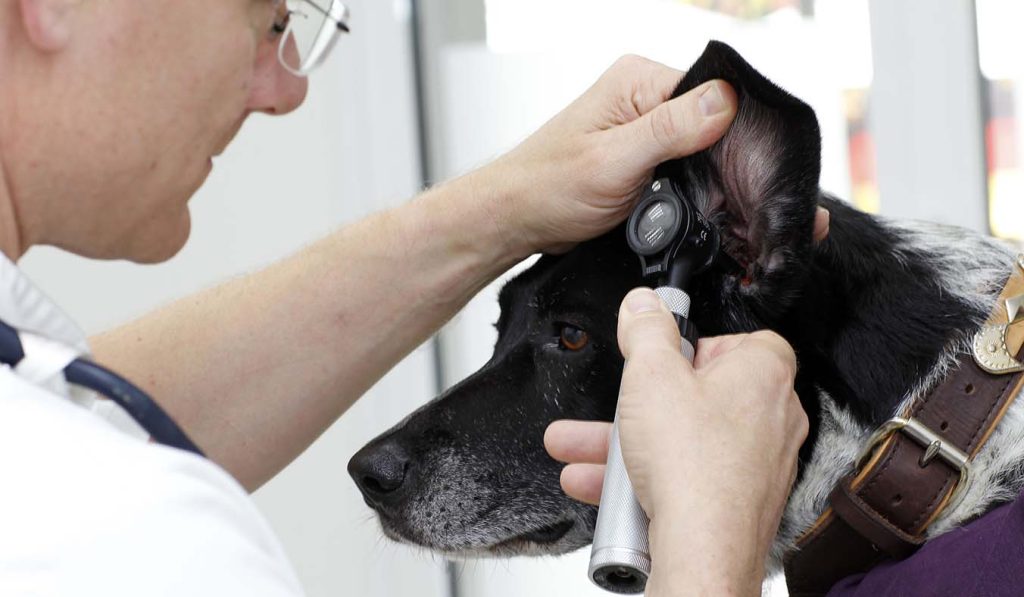Parasites are a common concern for puppies, posing potential health risks and discomfort. We’ll explore the symptoms of parasitic infestations in puppies, when deworming is necessary, how to deworm your puppy, and what to expect after deworming.
Symptoms of Parasitic Infestations in Puppies:
- Digestive Disturbances: Puppies afflicted with internal parasites often display noticeable digestive issues, such as frequent diarrhea, sporadic vomiting, or episodes of constipation. These symptoms can range from mild discomfort to severe distress, depending on the type and extent of the parasitic infestation. Persistent digestive disturbances may lead to dehydration, weight loss, and overall weakness in affected puppies.
- Poor Growth: Parasites wreak havoc on a puppy’s delicate digestive system, hindering proper nutrient absorption and utilization. Consequently, affected puppies may exhibit signs of stunted growth and failure to thrive. Despite adequate nutrition, they may lag behind their littermates in size and weight, reflecting the detrimental impact of parasitic infestations on their developing bodies.
- Potbellied Appearance: Certain parasites, such as roundworms, have a propensity to multiply rapidly within a puppy’s intestines, forming a tangled mass that gives rise to a distinctive potbellied appearance. This abdominal distension is particularly pronounced following meals when the worms feed and grow, causing visible swelling and discomfort in the affected puppy. The potbellied appearance serves as a telltale sign of a severe parasitic burden requiring prompt intervention.
- Dull Coat: Parasitic infestations compromise a puppy’s overall health and vitality, manifesting externally in the form of a lackluster, unkempt coat. Due to inadequate nutrition and the body’s prioritization of essential functions over non-essential ones like coat maintenance, affected puppies may exhibit a dull, dry, or disheveled appearance. The coat may lose its natural shine and luster, signaling underlying health issues that warrant attention and treatment.
- Lethargy: Infested puppies often struggle with reduced energy levels and a general sense of lethargy or malaise. They may display a reluctance to engage in typical puppy activities, such as play, exploration, or social interaction, preferring instead to retreat and rest for extended periods. Lethargy in puppies with parasitic infestations is indicative of the body’s efforts to conserve energy and combat the underlying health threat posed by internal parasites.
Recognizing these specific symptoms of parasitic infestations in puppies is crucial for early detection and intervention. Prompt veterinary attention and appropriate treatment protocols can alleviate discomfort, restore health, and ensure the optimal development and well-being of affected puppies.
When to Deworm Puppies:

Deworming is a critical aspect of puppy care, with timing playing a crucial role in ensuring their health and well-being.
- Early Initiation: Deworming typically commences when puppies are as young as two weeks old. At this stage, they are highly susceptible to parasitic infestations, primarily due to their immature immune systems and potential exposure to parasites from their mother’s milk or environment.
- Frequent Administration: Deworming should be repeated every two to three weeks during the initial stages of a puppy’s life, up until they reach approximately 16 weeks of age. This frequent schedule is necessary to target parasites at different life stages and prevent their proliferation within the puppy’s body.
- Veterinary Guidance: It’s crucial to consult with a veterinarian to establish a tailored deworming schedule for your puppy. Veterinarians take into account various factors, including the puppy’s breed, health status, living environment, and risk of exposure to parasites, to determine the most appropriate deworming protocol.
- Risk Assessment: Puppies residing in environments with a high risk of parasite exposure, such as kennels, breeding facilities, or areas with a significant stray animal population, may require more frequent deworming. Similarly, puppies with outdoor access or those in close contact with other animals may be at an increased risk and may benefit from more frequent deworming.
- Regular Maintenance: Following the initial deworming series, puppies should transition to a regular deworming schedule as recommended by their veterinarian. This schedule typically involves periodic deworming treatments to prevent reinfestation and maintain optimal gastrointestinal health.
- Preventive Measures: In addition to deworming, implementing preventive measures such as regular fecal examinations, maintaining a clean living environment, and practicing good hygiene habits can further reduce the risk of parasitic infestations in puppies.
By adhering to a comprehensive deworming schedule and seeking guidance from a veterinarian, pet owners can effectively protect their puppies from the harmful effects of internal parasites and promote their overall health and well-being. Early intervention and proactive preventive measures are essential in ensuring that puppies grow into healthy and thriving companions.
How to Deworm Your Puppy:
Deworming your puppy is a crucial step in safeguarding their health and well-being from the threat of internal parasites. Here’s a detailed guide on how to effectively deworm your puppy:
- Consult Your Veterinarian: Begin by scheduling a consultation with your veterinarian to discuss your puppy’s deworming needs. Your veterinarian will assess your puppy’s health status, age, weight, and potential risk of parasite exposure to determine the most suitable deworming protocol. They will recommend the appropriate dewormer and dosage tailored to your puppy’s specific requirements.
- Choose the Right Deworming Medication: Deworming medications come in various formulations, including oral suspensions, tablets, or spot-on treatments. Your veterinarian will prescribe the most appropriate dewormer based on your puppy’s age, weight, and susceptibility to parasites. Ensure that you follow their recommendations precisely to maximize the effectiveness of the treatment.
- Administer the Deworming Medication: Once you have obtained the prescribed dewormer from your veterinarian, carefully administer the medication to your puppy according to the provided instructions. Depending on the formulation, you may need to administer the dewormer orally by mixing it with food or directly administering it into your puppy’s mouth. Alternatively, spot-on treatments are applied to the skin at the base of the puppy’s neck.
- Follow Dosage Guidelines: It’s crucial to adhere to the recommended dosage guidelines provided by your veterinarian. Avoid under-dosing or overdosing your puppy, as improper dosing can compromise the effectiveness of the treatment and potentially harm your puppy’s health. Use a measuring device or syringe provided with the medication to ensure accurate dosing.
- Monitor for Side Effects: While deworming medications are generally safe, some puppies may experience mild side effects such as diarrhea, vomiting, or lethargy. Keep a close eye on your puppy following deworming and observe for any unusual symptoms or behaviors. If you notice any concerning side effects, contact your veterinarian immediately for guidance and assistance.
- Repeat Treatment as Recommended: Depending on your veterinarian’s recommendations and the specific deworming protocol, you may need to repeat the treatment at regular intervals to ensure comprehensive parasite control. Follow your veterinarian’s instructions regarding the frequency of deworming treatments to effectively eliminate parasites and prevent reinfestation.
By following these steps and working closely with your veterinarian, you can ensure that your puppy receives the appropriate deworming treatment tailored to their individual needs. Proactive parasite control is essential for protecting your puppy’s health and ensuring a happy and active life free from the burden of internal parasites.
After Deworming: Ensuring Your Puppy’s Continued Well-being

- Parasite Elimination: Following the administration of deworming medication, you may observe the presence of worms in your puppy’s stool. This occurrence is a positive sign indicating that the medication is effectively eliminating parasites from your puppy’s system. While it may be unsettling to witness, it’s essential to understand that the expulsion of worms is a natural and necessary part of the deworming process. As your puppy continues to pass worms in their stool over the following days, rest assured that the treatment is successfully targeting and eradicating internal parasites.
- Improved Health: With parasites eliminated from their system, puppies often undergo a remarkable transformation in their overall health and well-being. Freed from the burden of internal parasites, puppies typically experience a significant improvement in their vitality and demeanor. You may notice that your puppy displays increased energy levels, a revived appetite, and a newfound zest for life. Furthermore, as their body no longer expends energy combating parasites, puppies may exhibit a shinier, healthier coat, reflecting their improved nutritional status and enhanced overall health.
- Preventative Measures: While deworming effectively addresses existing parasite infestations, it’s crucial to implement preventive measures to safeguard your puppy’s health and prevent future infestations. Maintaining a clean and hygienic living environment for your puppy is paramount in minimizing their exposure to parasites. Regularly clean and disinfect your puppy’s living quarters, including bedding, toys, and feeding bowls, to eliminate any potential sources of contamination. Additionally, practice good hygiene habits, such as promptly removing and disposing of your puppy’s feces from the environment, to prevent the spread of parasitic eggs and larvae.
Furthermore, adhere to your veterinarian’s recommendations regarding preventive treatments, such as flea and tick control and regular parasite screenings, to provide comprehensive protection against a wide range of parasites. By incorporating these preventive measures into your puppy’s routine care regimen, you can effectively minimize the risk of future parasitic infestations and ensure their continued health and well-being.
After deworming your puppy, closely monitor their stool for the presence of worms, observe improvements in their overall health and vitality, and implement preventive measures to maintain a parasite-free environment. By taking proactive steps to address parasitic infestations and prevent their recurrence, you can help your puppy thrive and enjoy a happy, healthy life free from the burden of internal parasites.
Deworming is an essential aspect of puppy care to ensure their health and well-being. By understanding the signs of parasitic infestations, adhering to a deworming schedule, and working closely with your veterinarian, you can protect your puppy from the risks associated with internal parasites and set them on the path to a happy and healthy life.



